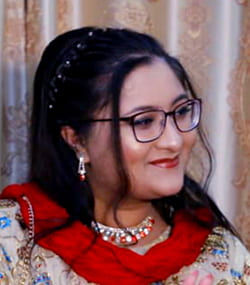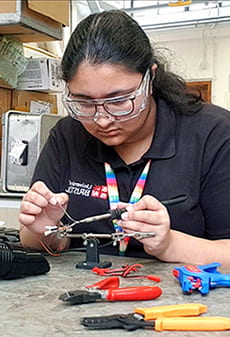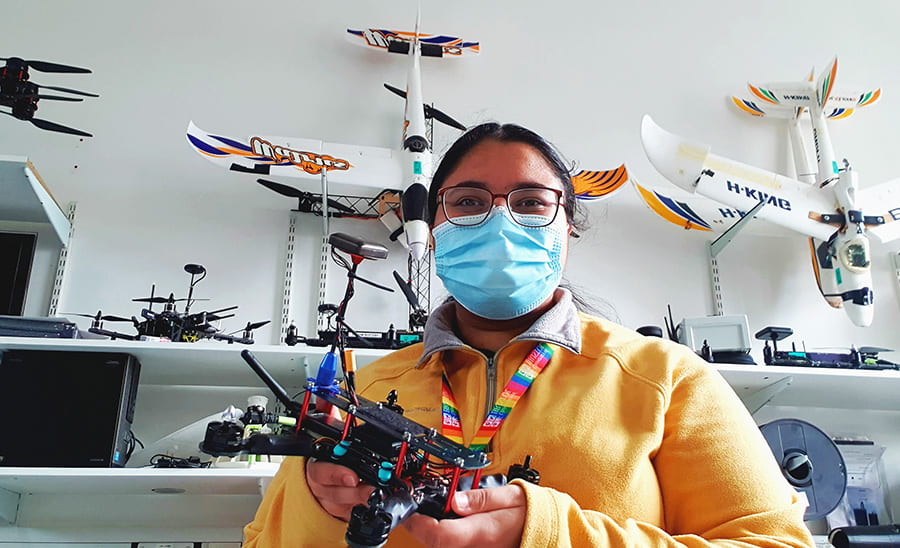Support for My Career: Rainaa Ahmed
“An apprenticeship gives you the best of both worlds – both work and study.”
Rainaa is a Technical Apprentice in Engineering’s Technical Services. She is in the third year of her apprenticeship and here gives us an insight into how she discovered and chose this career path.
Tell us about you – where are you from, who you are outside of work?
I was born in Bristol to a large family – I’ve got four brothers and one sister – so I’m very familiar with the city… it’s a great place to work. In 2016, The Guardian said that, in the UK, Bristol was one of the happiest cities to work in. I’m still living with my family and hope to move out at the end of my apprenticeship, though Bristol is a bit pricey.
Lockdown’s given me some time for spontaneity, and I’ve developed a new interest in older films and found a lot of new music I like. I’ve also picked up my violin again so I can play with my friend. I’ve enjoyed being able to rediscover old hobbies, although I don’t sound as good on the violin as I thought I did!
I’ve got pen pals from around the world – I like receiving letters written on paper. I started getting pen pals about two or three years ago – around the time I started my apprenticeship. Writing to other countries has given me an appreciation for other cultures and a sense of global politics, plus it’s given me a bucket list of places I want to visit. Sometimes, I meet people at work and can relate where they’re from because of people I know through writing pen pal letters.
I have always written quite a lot… I still write in the evenings, experimenting with fiction. With letter-writing, you have to be patient as the post takes quite a while… yes it would be easier to text, but it’s lovely to get home and find a mailbox full of letters waiting for you.
Tell us how you got here – what did you do to get here, what decisions did you make, what motivated you?
 I came straight out of my GCSEs into an apprenticeship here in Technical Services. At school, there wasn’t a lot of attention on apprenticeships – just ‘go into full-time work’ or ‘go into college’ – and academia was highly encouraged. I might have enjoyed it but didn’t think full-time study was for me. I am really into English Literature and was pushed to consider journalism instead of a STEM subject – I do write quite a lot, but I didn’t want that to be my job. Ultimately, I have a competitive streak from having so many brothers, so this meant I wanted to go into something with fewer women in it!
I came straight out of my GCSEs into an apprenticeship here in Technical Services. At school, there wasn’t a lot of attention on apprenticeships – just ‘go into full-time work’ or ‘go into college’ – and academia was highly encouraged. I might have enjoyed it but didn’t think full-time study was for me. I am really into English Literature and was pushed to consider journalism instead of a STEM subject – I do write quite a lot, but I didn’t want that to be my job. Ultimately, I have a competitive streak from having so many brothers, so this meant I wanted to go into something with fewer women in it!
I went to a specialist Science secondary school in Bristol, Redland Green, so did always enjoy STEM subjects. It was more pure Chemistry, Physics and Biology as we didn’t have much focus on Engineering as a subject. There was lots of funding for labs and science at my school, so I was used to the lab environment, but when I first walked to into the Flight Research lab and saw lots of drones, I still felt a bit daunted and didn’t want to touch anything!
My parents encouraged me to choose a career early on too, but I didn’t want to do only work or only study straight away. I looked at a government website for jobs and came across apprenticeships and looked into a few. Then I heard back from this one – I didn’t know exactly what it would involve initially. I actually got the call whilst rock climbing at summer camp – I was at the top of this big rock and the call was perfectly timed just as I managed to get some signal and catch my breath!
I am now a third-year apprentice technician, currently on placement in the Flight Research lab. My first year was based mainly in college, with four days at Weston-Super-Mare and one day at work. I’ve been on placement in my lab for about two years. Initially, the plan was that I’d rotate around different labs to get a better understanding of what happened in each space, but I enjoyed my time so much that I asked to stay longer! In total, my apprenticeship lasts for four years.
I have a colleague, Duncan Hine, who is a technical specialist – he arrived about 6 – 12 months after I did. He has lots of technical and industry experience, and I learn a lot from him. He actually helped me to build my first drone, and we’re working through programming the software for it at the moment.
In the lab, there are lots of postgraduate researchers and four academics to work with. It’s definitely different from doing GCSEs, and different from what I was imagining! I thought I was heading towards IT/software and found this is much more hands-on… I stuck with it as I enjoyed it.
When I was at school, having an interest in the Sciences meant you were encouraged to think only about academic options rather than an industry or apprenticeship route. There wasn’t a lot of information on apprenticeships as most secondary schools have some kind of post-16, sister school or college they encourage you to go to. But I’ve noticed that with the new apprenticeship levy, there are lot of new positions opening up, and people are being encouraged to pursue practical vocational skills.
Why do you like your job?
 There’s always something to get your hands on. There are no repetitive days – I’m quite an impulsive person so that works for me! I’m mostly asked to help with project work, if I’m not busy managing the lab – for example, cutting out acrylic parts using the laser cutter, or getting a technical drawing and going to the workshop. I learnt a lot of foundation technical skills in my first year as I was in college for four days a week, which really helped me adjust from being in school full-time.
There’s always something to get your hands on. There are no repetitive days – I’m quite an impulsive person so that works for me! I’m mostly asked to help with project work, if I’m not busy managing the lab – for example, cutting out acrylic parts using the laser cutter, or getting a technical drawing and going to the workshop. I learnt a lot of foundation technical skills in my first year as I was in college for four days a week, which really helped me adjust from being in school full-time.
At first, it was intimidating as machines like the mills and lathes were really large and noisy, but I had lots of tuition and help from others to learn. I’m proud of how far I’ve progressed, as now I can look at a drawing of a component someone has requested and work backwards to imagine how I could make it, or have a problem described to me and come up with practical solutions. I enjoy helping others out, as it gives me a sense of accomplishment.
How do you make it work in terms of work/life balance?
Time management is something I’ve had to work on – at school everything is scheduled for you whereas at work you must manage your own tasks and work. If I’m honest, I’m still working on this now! I had a fantastic tip from Steve Harding, my previous line manager, who told me to bring a diary around with me and write in everything with a deadline – it was great advice. I figured out that having a set to-do list also worked really well. I have a whole Excel spreadsheet with all my tasks written down, estimated deadlines, a comment section so I can remind myself of details later. Without this, I’d flounder between tasks or find myself with very little to do. You have to stick to it, but it’s encouraging to see a list of all the things I’ve managed to cross off.
How have you been supported, and how do you support others?
I’ve mentioned Steve Harding and Duncan Hine, but the Technical Managers team in the faculty have also been really helpful. For example, Darren Roderick, Amanda Simpson and Jude Bramton are all senior managers and good to get advice from and talk to. When I first started work, I was really apprehensive about meeting people in senior roles, but they were all lovely and always up for a laugh. Jude has brought up a few opportunities she thought would really benefit me – for example, there was a Women in Engineering conference focused on female apprentices on the weekend I attended, which I wouldn’t have known about otherwise. They also have their own experiences in Technical Services which they can advise on, such as how to say no to people and how to manage your time, which has helped me. Sometimes I have to say no to requests too and so have had to learn to manage expectations by telling people what I realistically can do by when.
My parents have been really supportive – at first, they were worried that I wasn’t going straight into college, but they helped me to prepare for my interview here. College in my first year was in Weston-Super-Mare and back then I was really disorganised getting myself there so my mum would even get me to the bus station to put me on the bus to make sure I got to college!
What next?
I want to specialise in something – the work in the Flight Research Lab is highly technical, so I am trying to learn as much as I can. As I’ve already been on placement in the lab for two years and have a good understanding of the role, I’d like to become a technician here. Initially, I did have a lot of imposter syndrome whilst learning on the job. I asked a lot of questions and did make a few mistakes, which I’ve tried to learn from. Later on, I became more interested in the area and read around the subject outside of work to develop my experience. I do want to stay with the University as it has a great culture and I wouldn’t want to let that go! From what I’ve heard, industry does pay better, but I’d rather work somewhere where I feel a real sense of teamwork and engagement. There’s also been a lot of drive towards recruiting more women and people from ethnic minorities, which is highly encouraging. One of my goals is to be professionally registered as an engineer – I think it shows a lot of dedication to the role and demonstrates a level of competence.
What advice would you give people considering a similar career?
Although it’s written off easily enough, the most important work you can do is in improving your soft skills – time management, organisation, and your self-confidence, to name a few. Going in straight from school, I wish I’d put more work into these skills from the start. You need to be more self-sufficient and work on your work-life balance. One benefit to being on an apprenticeship is that you get a lot of support from mentors, other apprentices, etc. and it’s important to take advantage of that.
It’s good to talk to people who are more established in their jobs and have a lot of experience. The machinists downstairs in the workshop have a wealth of information and I like to ask them questions. They give me good advice and tell me about other jobs they’ve done or their experiences from working in industry. People are really inclined to help you out and there’s a good culture of offering advice and sharing knowledge.
For me, I identified that I enjoyed science and IT, and it was important for me to find a career in STEM. It did take a lot of poking around to find something which was right for me, though I knew that only going to work or college simply for the sake of it wasn’t what I wanted. An apprenticeship gives you the best of both worlds – both work and study!
How do you think the CV19 period will change your role or workplace?
The labs are definitely quieter than usual, but there are some positives – I’m meeting a lot more with my manager and other people in the organisation. You don’t have to sort out a room or worry about being late, because there’s a lot of flexibility with video calls. It’s much easier to tune into meetings from your desk then have to excuse yourself from your office or lab for an hour or two. For example, there’s a session for BAME staff next week which I’m planning to attend. Before, I wouldn’t have had the opportunity to go to before, as I might’ve been too busy or felt guilty about leaving my desk for something which wasn’t directly tied into my lab work.
I’ve also had a lot of time to tie up loose ends with projects which have been sat on the backburner for a while, and it’s nice to have a thorough tidy-up. We’re now starting to pick up where we left off and seeing how to make it work with reintroducing people back into the lab.


